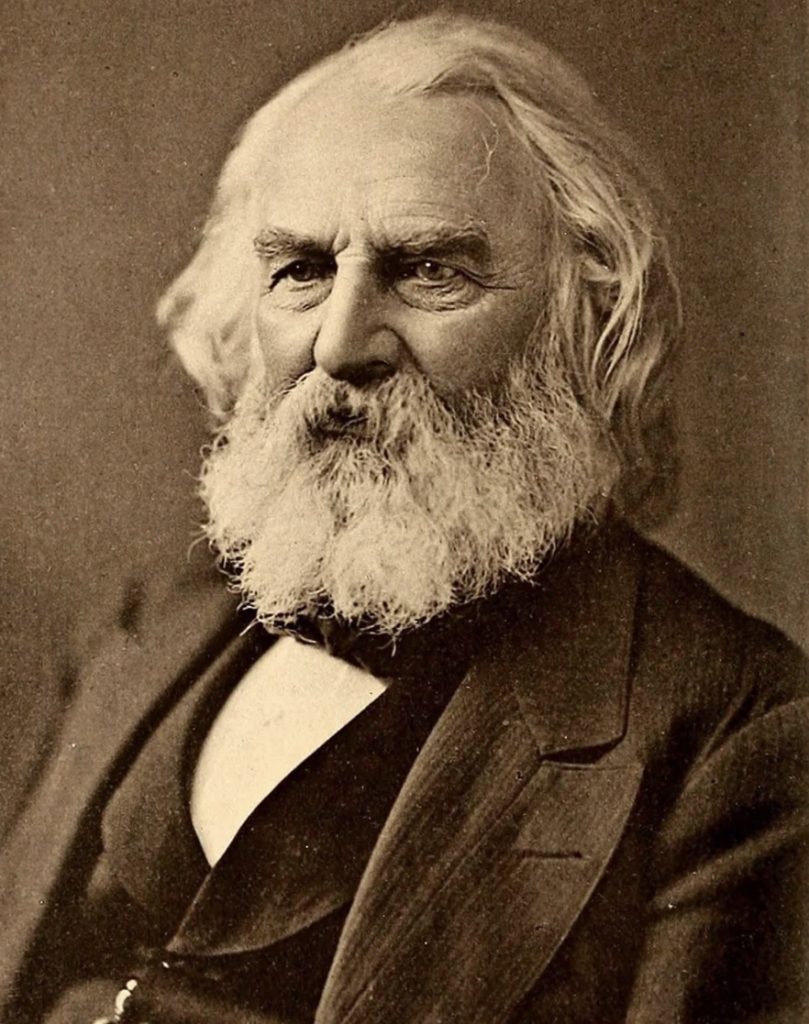Nació el 27 de febrero de 1807 en Massachusetts, EE. UU.—fallecido el 24 de marzo de 1882 en Cambridge, Massachusetts), Poeta, traductor, profesor y bibliotecario, fue uno de los poetas más populares y leído del siglo XIX en EE UU. tradujo La Divina Comedia de Dante. Asistió a escuelas privadas y a la Academia de Portland. Se graduó de Bowdoin College en 1825, sus versos aparecieron en revistas nacionales. Existe un busto suyo conmemorativo en la Abadía de Westminster en Londres. Longfellow House-Washington’s Headquarters National Historic Site fue la casa de Henry W. Longfellow, actualmente es un Museo con una importante actividad cultural y de lecturas de poesía en Cambridge.

COPOS DE NIEVE
Del seno del Aire,
De los pliegues de nubes de sus vestiduras sacudidos,
Sobre los bosques pardos y desnudos,
Sobre los campos de cosecha abandonados,
Silenciosa, suave y lenta
Desciende la nieve.
Así como nuestras fantasías nubladas
De repente toman forma en alguna expresión divina,
Incluso cuando el corazón atribulado hace
En el blanco semblante confiesa,
El cielo atribulado revela
La pena que siente.
Este es el poema del aire,
Grabado lentamente en sílabas silenciosas;
Este es el secreto de la desesperación,
guardado durante mucho tiempo en su nublado seno,
Ahora susurrado y revelado
al bosque y al campo.
***
SUBE LA MAREA, BAJA LA MAREA
La marea sube, la marea baja,
El crepúsculo se oscurece, el zarapito llama;
A lo largo de las arenas húmedas y marrones
El viajero se apresura hacia la ciudad,
Y la marea sube, la marea baja.
La oscuridad se instala en tejados y paredes,
Pero el mar, el mar en la oscuridad llama;
Las pequeñas olas, con sus suaves y blancas manos,
Borran las huellas en la arena,
Y la marea sube, la marea baja.
Amanece; los corceles en sus establos
patalean y relinchan a la llamada del posadero;
El día vuelve, pero nunca más
Regresa el viajero a la orilla,
Y la marea sube, la marea baja.
Traducción: Nidia Hernández & D. L
***
SNOW-FLAKES
Out of the bosom of the Air,
Out of the cloud-folds of her garments shaken,
Over the woodlands brown and bare,
Over the harvest-fields forsaken,
Silent, and soft, and slow
Descends the snow.
Even as our cloudy fancies take
Suddenly shape in some divine expression,
Even as the troubled heart doth make
In the white countenance confession,
The troubled sky reveals
The grief it feels.
This is the poem of the air,
Slowly in silent syllables recorded;
This is the secret of despair,
Long in its cloudy bosom hoarded,
Now whispered and revealed
To wood and field.
***
THE TIDE RISES, THE TIDE FALLS
The tide rises, the tide falls,
The twilight darkens, the curlew calls;
Along the sea-sands damp and brown
The traveller hastens toward the town,
And the tide rises, the tide falls.
Darkness settles on roofs and walls,
But the sea, the sea in the darkness calls;
The little waves, with their soft, white hands,
Efface the footprints in the sands,
And the tide rises, the tide falls.
The morning breaks; the steeds in their stalls
Stamp and neigh, as the hostler calls;
The day returns, but nevermore
Returns the traveller to the shore,
And the tide rises, the tide falls.


